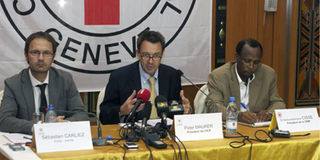EU working to create 'credible' army in crisis-hit Mali

PHOTO | HABIBOU KOUYATE International Red Cross (ICRC) president Peter Maurer (C), ICRC spokesperson Sebastian Carliez (L) and president of the Malian Red Cross (CRM) Abdourahamane Cisse give a press conference on October 24, 2012 in Bamako. Maurer is on a visit to Mali and the region to take state of the Malian crisis that is displacing thousands into neighbouring countries.
What you need to know:
- Radical groups including members of Al-Qaeda's north Africa branch took control of Mali's vast desert north amid the chaos that followed a March coup led by junior army officers
- European leaders have vowed to back a proposed African force that may be sent to flush out the Islamists, but have said their support will not include EU combat troops
- The Economic Community of West African States, which includes Benin, has said it is ready to send a force to Mali, but several factors have delayed deployment
COTONOU
The European Union is working to establish a credible army in Mali, where radical Islamists took control of the north after a military coup, the EU commission president said Friday.
Jose Manuel Barroso spoke alongside Benin's President Thomas Boni Yayi, who addressed reporters for the first time since allegedly evading an assassination attempt involving poison pills.
Yayi, the current head of the African Union, did not comment on the so-called "poison plot," but appeared in good health.
Barroso, who was in Ivory Coast on Thursday, said EU leaders "remain very concerned about the situation in Mali."
"We are currently working on a number of plans, including how to guarantee that there is a republican, credible army," in the country, he added.
Radical groups including members of Al-Qaeda's north Africa branch took control of Mali's vast desert north amid the chaos that followed a March coup led by junior army officers.
An interim civilian government has failed to assert itself and Western governments fear the region could become a sanctuary for extremists.
European leaders have vowed to back a proposed African force that may be sent to flush out the Islamists, but have said their support will not include EU combat troops.
The Economic Community of West African States, which includes Benin, has said it is ready to send a force to Mali, but several factors have delayed deployment. (Read: African Union readmits Mali, backs plan to retake north)
Yayi said he and Barroso discussed Europe's role in the Mali crisis, but made no mention of the assassination scheme that, according to prosecutors, saw his niece, personal doctor and others conspire to replace his anti-pain medicine with poison.
Prosecutors have said the conspiracy was busted before the president ingested anything toxic, while some oppositions members have raised suspicion as to the truth of the story.
Three people are reported to be in custody, while arrests warrants have been issued for two others.
Some in Benin have suggested that the allegations were merely intended to smear the president's enemies, including the accused mastermind, businessman Patrice Talon, who backed Yayi before reportedly breaking with the president over a contracts dispute.




